|
|
|
Sort Order |
|
|
|
Items / Page
|
|
|
|
|
|
|
| Srl | Item |
| 1 |
ID:
168557


|
|
|
|
|
| Summary/Abstract |
This article develops a theory of competitive intervention in civil war to explain variation in the global prevalence of intrastate conflict. I describe the distortionary effects competitive interventions have on domestic bargaining processes and explain the unique strategic dilemmas they entail for third-party interveners. The theory uncovers the conditional nature of intervention under the shadow of inadvertent escalation and moves beyond popular anecdotes about “proxy wars” by deriving theoretically grounded propositions about the strategic logics motivating intervener behaviors. I then link temporal variation in patterns of competitive intervention to recent decreases in the prevalence and average duration of internal conflicts. The theory is tested with a quantitative analysis of all civil wars fought between 1975 and 2009 and a qualitative case study of the Angolan civil war (1975–1991). My results underscore the importance of a generalizable account of competitive intervention that not only explains past conflicts, but also informs contemporary policy.
|
|
|
|
|
|
|
|
|
|
|
|
|
|
|
|
| 2 |
ID:
181867
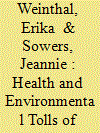

|
|
|
|
|
| Summary/Abstract |
The effects of conflict on public health and ecosystem well-being are understudied and rarely figure in public debates about war-making. Protracted conflicts are particularly damaging to people and environments in ways that are inadequately documented. In recent wars in the Middle East and North Africa, parties to the conflicts have induced hunger and displacement and undermined public health through the use of violence and economic policies that deprive civilians of access to food, water, fuel, and livelihoods. Environmental pollution is widespread, particularly in cities that became war zones, while the COVID-19 pandemic has deepened conflict-induced poverty and food insecurity.
|
|
|
|
|
|
|
|
|
|
|
|
|
|
|
|
| 3 |
ID:
173136
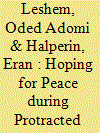

|
|
|
|
|
| Summary/Abstract |
Hope is an essential component in the pursuit of political change. In order to hope, citizens need to wish for the change and have some expectations that it could materialize. This article explores how the two components of hope (i.e., wishes and expectations) are constructed in the seemingly hopeless case of a protracted and violent conflict. Utilizing a large-scale survey administered in Israel, the West Bank, and the Gaza Strip, we show that citizens’ appraisals of their adversary’s wishes and expectations for peace affect their own wishes and expectations, which, in turn, influences their willingness to support peacebuilding efforts. Regrettably, citizens’ tendency to underestimate their rival’s wish for peace lessens their own hopes, which further abates the support for peacebuilding. The study is the first to illustrate a mechanism by which hope for peace is constructed and the pathways by which hope facilitates resolution. Theoretical and applied implications are discussed.
|
|
|
|
|
|
|
|
|
|
|
|
|
|
|
|
| 4 |
ID:
152843


|
|
|
| 5 |
ID:
180654
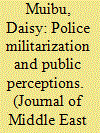

|
|
|
|
|
| Summary/Abstract |
How can one encourage greater public cooperation with police forces and improve their legitimacy during times of protracted conflict and fragile governance? Can police militarization play a role in improving public perceptions toward law enforcement in these contexts? The prevailing perception is that police militarization undermines public opinion toward the police. Yet, there has been little empirical evaluation of the impact that militarization has on public attitudes in conflict-affected regions. Relying on original survey data collected in the city of Kismaayo, Somalia, this study examines the impact that perceived police militarization has on public perceptions toward a newly introduced police force operating in a region with an active insurgent-terrorist threat. Results of regression analysis and qualitative field interviews suggest that militarization can actually improve residents’ willingness to cooperate with the police, as well as perceptions of police legitimacy. The perceived militarization of this nascent police force conveys a level of preparedness and professionalism to residents exposed to decades of conflict.
|
|
|
|
|
|
|
|
|
|
|
|
|
|
|
|
| 6 |
ID:
151154


|
|
|
|
|
| Summary/Abstract |
Recognition is vital for conflict resolution. This study was designed to learn more about the factors underlying the willingness to recognize the pain and suffering of the opponent in the asymmetrical protracted conflict between Israelis and Palestinians. Data were collected through a public opinion survey conducted with a representative sample of Israeli-Jewish adults (N = 511). Perceptions of threat/distrust toward Palestinians and dehumanization of Palestinians each made a significant contribution to explaining Jewish-Israeli (un)willingness to recognize Palestinian pain and suffering (R2 = .36). Hawkishness made an added significant contribution to the overall explanatory power of the model (R2 = .38). Higher scores on the threat/distrust scale and the dehumanization scale, as well as higher hawkishness predicted decreased willingness to recognize Palestinian pain and suffering. The implications of our findings for understanding the role of recognition and of moral concern in conflict resolution are discussed.
|
|
|
|
|
|
|
|
|
|
|
|
|
|
|
|
| 7 |
ID:
128964
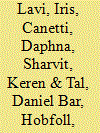

|
|
|
|
|
| Publication |
2014.
|
| Summary/Abstract |
Can endorsement of the ethos of conflict alter psychological effects of exposure to political violence? Israelis and Palestinians have been in a state of political and military turmoil for decades. We interviewed 781 Israelis and 1,196 Palestinians living in the West Bank, Gaza Strip, and East Jerusalem. Using structural equation modeling, we found that among those with a weak adherence to ethos of conflict, exposure predicted higher levels of hatred. For Israelis with a weak adherence to ethos of conflict, exposure predicted higher psychological distress and fear. For Palestinians with weaker adherence to ethos of conflict, stronger exposure predicted stronger threat perceptions. Israelis and Palestinians with a strong adherence to the ethos showed steady and high levels of negative emotions and threat, regardless of exposure. These results indicate that ethos of conflict is a double-edged sword that both protects and protracts the conflict. Although it serves as an engine fueling the conflict, it also plays a meaningful role as an empowering force for people suffering the psychological burden of an ongoing conflict.
|
|
|
|
|
|
|
|
|
|
|
|
|
|
|
|
| 8 |
ID:
101269
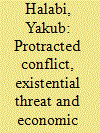

|
|
|
|
|
| Publication |
2010.
|
| Summary/Abstract |
This article argues that a protracted conflict, in general, has strengthened the state vis-à-vis the society in Egypt, Israel, South Korea, Syria and Taiwan. Yet, the existentially threatened states, namely, Israel, South Korea and Taiwan, have pursued economic development and industrialization as a strategic objective. While all three states have been strategically important for the hegemon, the United States, the latter has encouraged them to adopt an export-oriented strategy and opened its own market to their exports. Given the rise in state strength, an existentially threatened state becomes more capable of extracting taxes and mobilizing the society for industrialization. Both Egypt and Syria, in contrast, were merely engaged in a protracted conflict. Consequently, they were not under pressure to maximize their power through industrialization and/or export-led growth strategy, and each explored, in its own unique way, short-cut solutions for regaining its occupied territory.
|
|
|
|
|
|
|
|
|
|
|
|
|
|
|
|
| 9 |
ID:
105324
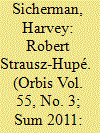

|
|
|
|
|
| Publication |
2011.
|
| Summary/Abstract |
The author assesses the long life of Robert Strausz-Hupé and the many roles he played: immigrant, professor, author, diplomat and think tank founder.
|
|
|
|
|
|
|
|
|
|
|
|
|
|
|
|
| 10 |
ID:
158948
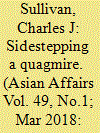

|
|
|
|
|
| Summary/Abstract |
Russia's military intervention in Syria (2015-present) has ensured the Assad regime's survival to date. Why though has Russia succeeded in achieving its objective? This article provides an analysis of Russia's involvement in the Syrian civil war in comparison to the Soviet Union's military debacle in Afghanistan (1979-89). Accordingly, by avoiding the USSR's mistakes in Afghanistan, this article posits that Russia has not become entangled in a protracted conflict in Syria. In Syria, Russia has militarily intervened to buttress the Assad regime, not to reorganize the host government's leadership and assume control over the war effort. Meanwhile, Syrian opposition forces lack concerted international support and Russia has allies that are assisting the embattled Syrian government. Lastly, Russia intends to ‘freeze’ the Syrian civil war in place by (i) pressuring opposition forces to submit and other countries to re-embrace Damascus in a diplomatic forum, (ii) endorsing Syria's claim to sovereignty, and (iii) relying upon a small military presence to deter others from destabilizing Assad's rule.
|
|
|
|
|
|
|
|
|
|
|
|
|
|
|
|
|
|
|
|
|